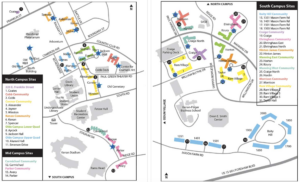WHY IS IT IMPORTANT?
Do your residents know what they can and can’t RECYCLE and COMPOST on campus? Do they know where to properly recycle and compost things on campus? Do they know what happens to the recyclables and compostables when it leaves campus?
These are all examples of questions that you can teach your residents about recycling and composting! By recycling and composting properly, we can ensure that more materials get recycled, lessen the costs associated with recycling, and reduce compostable waste from ending up in landfills.
Since we’re still at the start of the school year, educate your new residents on where/how to recycle and compost on campus!
WHAT CAN WE RECYCLE ON CAMPUS?
-
In the Blue Recycling Bins:
- Plastic bottles, tubs, jugs, and jars
- Glass bottles
- Aluminum and steel cans
- Mixed paper
-
In the Blue Dumpster:
- Flattened Cardboard
-
In the Student Union:
- All Batteries
- Small Electronic Waste, such as cell phones, peripherals, cords, and chargers (e-waste compartment)
- Plastic Film
-
In Your Community Office:
- Clean and dry Plastic Film, including:
- Plastic grocery bags
- Product packaging wrap
- Air Pillows and Bubble Wrap
- Zip-close food storage bags (NOT frozen food bags)
- Recyclable plastic film must be stretchy not crunchy. NO chip bags or candy wrappers.
- Printer cartridges (inkjet & laser toner)
- Batteries
- Light bulbs
- Clean and dry Plastic Film, including:
Find more information here (Save this link as it is a good reference for yourself and your residents).
GUIDE TO COMPOSTING AT RESIDENCE HALLS
-
What CAN be Composted:
- ALL food waste and table scraps
- Soiled paper products (i.e. napkins, paper towels)
- Compostable packaging (i.e. most to-go boxes from the Bottom of Lenoir)
- Tea and coffee grounds, filters
- Hair and nail trimmings
-
What CANNOT be Composted:
- Plastic, including bags and plastic flatware
- Metal, including foil
- Glass
- Styrofoam
- Rubber, latex
- Chemicals
- Stickers
-
Where to Compost:

WHAT ARE SOME COMMON CONTAMINANTS IN OUR RECYCLING ON CAMPUS?
Common contaminants: NEVER in blue (recycling) bins:
- Plastic Bags -> Bring to the community desk
- Cups -> Cups with plastic lining or styrofoam cups are Trash
- Food-contaminated items -> COMPOST!
- Lids -> Trash
- Straws -> Trash
RECYCLING FACTS
- UNC-Chapel Hill fills enough trash dumpsters to line Cameron Avenue, Chapel Hill, every 106 days.
- North Carolinians recycle 85.4 pounds of materials a second. That’s impressive! But we throw away over 752 pounds of trash a second. That’s almost nine times what we recycle.
- Recycling one ton of aluminum cans saves the equivalent of 1,665 gallons of gasoline.
- By producing a ton of paper from recycled materials, energy consumption is cut in half, and 17 trees are saved.
WHAT COULD YOUR PROGRAM LOOK LIKE?
- Set up a recycling shootout where residents toss recyclables into their appropriate bins. You could include some
non-recyclables to test your residents’ knowledge! - Hold a recycling scavenger hunt! Have your residents visit the different types of recycling bins we have on campus.
- Create an educational bulletin board in your hall made from recycled materials!
- Set up a booth and inform residents about composting in the residence halls
- Creative events and ideas are encouraged!
- Remember to take pictures of your programs and send them to me (cbarello@ad.unc.edu) for points and to be featured on the @uncgreengames Instagram!
For more info visit the Office of Waste Reduction and Recycling Website.
Email: Greengames@unc.edu Website: go.unc.edu/greengames
